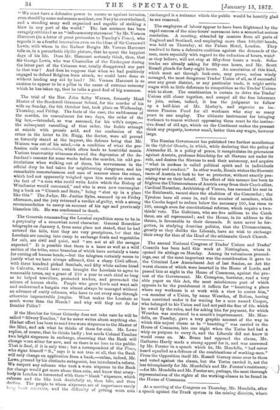The annual National Congress of Trades' Unions and Trades' Councils
has been held this week at Nottingham, where it opened its sittings on Monday. Among its voluminous proceed- ings, one of the most important was the consideration it gave to the Criminal Law Amendment Act of last Session, an Act the worst clauses of which were inserted in the House of Lords, and passed late at night in the House of Commons, against the pro- test of the Government. Mr. Crompton, barrister, read a very able paper on this Act, the most mischievous part of which appears to be the punishment it inflicts for "besetting a place where any workman is at work with a view to coerce him," —a member of a Union, by name Wearden, of Bolton, having been convicted under it for waiting for a man named Cooper, who belonged to his Union and had not paid the fine of 40s. which he owed by the rules, and for asking him for payment, for which Wearden was sentenced to a month's imprisonment. Mr. Mun- della, on Tuesday, gave a very graphic account of the way in which this unjust clause as to " besetting " was carried in the House of Commons, late one night when the Tories had had a whip on purpose to carry it, and the Liberals did not know it would come on. Mr. Bruce had opposed the clause, Mr. Gathorne Hardy made a strong appeal for it, and was answered by Mr. Forster in a speech which he, Mr. Mundella, "had never heard equalled as a defence of the combinations of working-men." From the Opposition itself Mr. Russell Gurney came over to them and voted against the clause, but the Tories carried it, not the leas triumphantly for Mr. Mundella's and Mr. Forster's resistance; —for Mr. Mundella and Mr. Forster are, perhaps, the most thorough representatives of the rights of the working-classes to be found in the House of Commons.


































 Previous page
Previous page